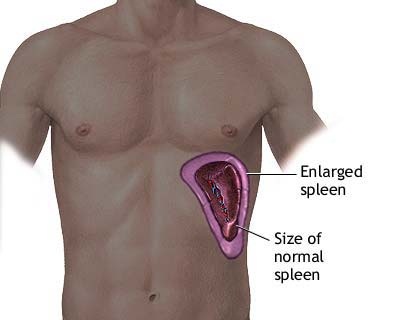Someone has severe pain in their abdomen, and one jumps into the conclusion that it is appendicitis, while another person may consider it to be a problem in the spleen, a rupture spleen or an enlarged spleen perhaps. So how do we identify who is right, the first person assuming that it was appendicitis, the second person who pointed to the spleen, or neither? Both parties pointed to what they know, and it is a common assumption in this type of situation. What we can do here, is to understand the symptoms followed by each and try to differentiate the two.

Source: Diseases Pictures
What is a spleen?
The spleen resides under our rib cage, and is our stomach’s neighbor. The spleen, which is a soft and spongy little organ, is an important element in our body, which plays a very important role in the immune system. This organ is not something that should be toyed with; it should not be removed unless the circumstances demand it. It is the organ responsible for the filtering and destruction of the old and damaged blood cells in our body. It produces white blood cells to protect us against infections against pathogens. In is the holder of platelets and red blood cells and is therefore, a small organ with a big job. However, this little organ is prone to get damaged easily.
Splenomegaly Symptoms
So let’s look into the scenario of the enlarged spleen first. This is a situation where a person may not feel anything wrong. There may be no symptoms as an indication of the problem inside. However, this is not the case always. People may experience pain in the left upper abdomen, or sometimes the particular area might feel full, extending up to the left shoulder. Sometimes, those experiencing an enlarged spleen, may, as a result of the spleen pressing against the stomach, feel that they are full before they have consumed any food, or when they have eaten very little. They may also face other complications such as fatigue, easy bleeding, anemia, constant infections; this would be considered symptoms of an enlarged spleen, which can be medically termed as splenomegaly. Spleen pain relief treatments depend on the cause and will be treated accordingly. For example, if the cause is a bacterial infection, antibiotics may be prescribed, but antibiotics will not provide relief if the cause is blood cancer.
Splenomegaly Causes
The causes of this particular problem vary from the cause of appendicitis. Some of the causes may include
- Viral infection, perhaps mononucleosis
- Infections to your heart’s inner lining, which would be the case in endocarditis
- Bacterial infections, such as syphilis
- Metabolic disorders such as Niemann-Pick Disease or maybe Gaucher’s
- Hemolytic anemia, which causes red blood cells to be destroyed prematurely
- Parasitic infections such as malaria
- Blood cancers such as leukemia
- Lymphomas such as Hodgkin’s disease
- Other diseases which affect the liver, such as Cirrhosis

Source: Your Health YouTube
What is an appendix?
Controversially, the appendix is another case altogether. For years this organ has been considered as a useless organ that resides in our body. However, there are suggestions among some evolutionists that it may have been used for the digestion of grass, as our ancestors had farming as a major component of their lives. Some even considered that this organ may have been used by babies and then it was just a useless lump of flesh inside an adult, who would face no adverse effects if the thing was removed. However, recent studies have proved all these theorists wrong in that this organ is a major player in the immune system that protects us from being victim to many pathogens, and many man made epidemics, including cancer! So it is hardly useless after all!
Appendicitis Symptoms
On the other hand, in the case of appendicitis the symptoms vary, in the case that the sudden pain for this disease starts in the right side of the lower abdomen, unlike the case of the spleen. It can cause nausea, vomiting, abdominal bloating, loss of appetite, sudden pain around your navel that moves to the right abdomen, pain that increases as you cough, walk or make any sudden movements, low level fever that would get worse as the disease moves forward. The person suffering from appendicitis could even suffer from diarrhea or even constipation. This is very different from the symptoms of an enlarged spleen. In any case, it is important to remember that the location of the pain can vary based on the situations surrounding the person; age, being pregnant, would change where the pain emerges. For instance, in the case of a pregnant woman, the pain may surface in the upper abdomen.
Appendicitis Causes
In this situation, it is completely different from that of an enlarged spleen, being that appendicitis is not caused by something else, it starts in the appendix itself. This happens when there is a blockage in the lining of the organ that would result in an infection being formed. The bacteria would multiply in a increasing pace, which would cause inflammation in the appendix, causing swelling and the filling up of pus inside. If treatment is not taken immediately, the appendix might rupture! Symptoms of appendicitis revolves around significant appendix pain.
So who are at risk of these two problems?
Anyone can come face to face with the issue of an enlarged spleen, but there a some who face a higher risk, like the people who are suffering from Niemann-Pick disease or Gaucher’s or other inherited metabolic diseases, children or even young adults with infections such as mononucleosis, or even the people who travel to countries or places where malaria is prevalent. In the case of appendicitis, you can consider that you are at risk, if, there is a history of appendicitis in your family, and if you are below the age of two or above the age of seventy.
So now that we have categorized the two organs, in terms of uses, symptoms, causes and risk, it would be easier for you to identify and distinguish them. Seek professional help immediately if you are experiencing chronic pain and/or need help with pain management.
Sources: http://www.mayoclinic.org/diseases-conditions/enlarged-spleen/basics/symptoms/con-20029324 and http://www.mayoclinic.org/diseases-conditions/appendicitis/basics/symptoms/con-20023582
Featured Image Source: Thinkstock/PIKSEL



